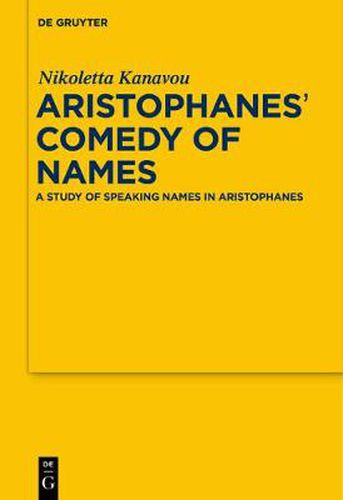Readings Newsletter
Become a Readings Member to make your shopping experience even easier.
Sign in or sign up for free!
You’re not far away from qualifying for FREE standard shipping within Australia
You’ve qualified for FREE standard shipping within Australia
The cart is loading…






The use of significant proper names is one of the most entertaining aspects of Aristophanes’ art; unsurprisingly, it has received much scholarly attention. But although there are a large number of articles and scattered comments on individual names, the present book offers the first systematic study on the subject. It is, as far as possible, an exhaustive discussion of significant proper names that appear in Aristophanes’ eleven extant plays: personal names (which occupy the largest part), theonyms, place-names, ethnics and demotics - all names that seem to be deliberately used for their meanings. Two appendixes discuss slave-names and selected names from Aristophanes’ fragmentary plays. Names are carefully analysed in their context, taking into account a range of factors such as language (etymology and word-plays), the content of the plays (the plots, set against their political and social background), and issues of characterisation. This work is thus meant to contribute simultaneously to Aristophanic scholarship, by enabling a deeper appreciation of Aristophanes ‘ humour, and to the field of Greek literary onomastics.
$9.00 standard shipping within Australia
FREE standard shipping within Australia for orders over $100.00
Express & International shipping calculated at checkout
The use of significant proper names is one of the most entertaining aspects of Aristophanes’ art; unsurprisingly, it has received much scholarly attention. But although there are a large number of articles and scattered comments on individual names, the present book offers the first systematic study on the subject. It is, as far as possible, an exhaustive discussion of significant proper names that appear in Aristophanes’ eleven extant plays: personal names (which occupy the largest part), theonyms, place-names, ethnics and demotics - all names that seem to be deliberately used for their meanings. Two appendixes discuss slave-names and selected names from Aristophanes’ fragmentary plays. Names are carefully analysed in their context, taking into account a range of factors such as language (etymology and word-plays), the content of the plays (the plots, set against their political and social background), and issues of characterisation. This work is thus meant to contribute simultaneously to Aristophanic scholarship, by enabling a deeper appreciation of Aristophanes ‘ humour, and to the field of Greek literary onomastics.